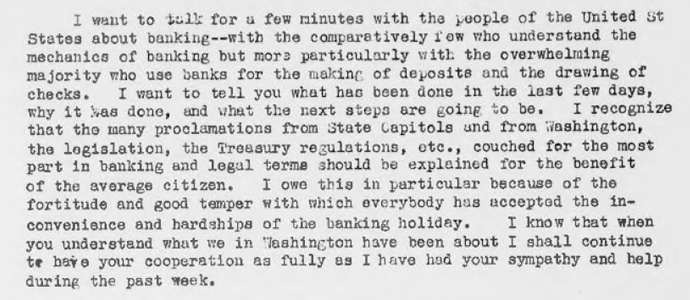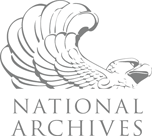 Visor de contenido web
Visor de contenido web
Fireside Chat on the Banking Crisis Curriculum Hub

- Historic Context
- Central Issue
- Key Questions
- Primary Sources
- Classroom Activities
- Links for More Information
- Distance Learning Opportunities
Historic Context
FDR believed recovery from the Depression was impossible without massive government action. He would use government to relieve hardship and pump life into a collapsed economy.
On his first full day in office, FDR confronted his greatest challenge— the banking crisis that threatened to destroy America’s economy.
Roosevelt began with a decisive act. Declaring a “bank holiday,” he temporarily closed all the nation’s banks. Then he called Congress into special session to pass emergency banking legislation.
Treasury officials feverishly began work on the Emergency Banking Act. Rushed to Congress four days later, it was approved within hours. The Act gave the government authority to examine bank finances, provide needed capital, and determine which banks were fit to reopen.
The healthy banks were authorized to reopen on March 13. But would people trust them? On March 12, FDR went on nationwide radio to reassure Americans. His appeal worked. The following morning, when the banks reopened, depositors lined up to return their money. The banking crisis was over.
“Capitalism was saved in eight days,” adviser Raymond Moley later recalled.
Central Issue
From 1929-1933, thousands of banks in towns and cities across the nation failed and millions of Americans lost their life savings.
The Glass-Steagall Banking Act stabilized the banks, reducing bank failures from over 4,000 in 1933 to 61 in 1934. To protect depositors, the Act created the Federal Deposit Insurance Corporation (FDIC), which still insures individual bank accounts. It granted the Federal Reserve System greater control over bank credit. And it ended risky stock speculation by commercial banks by separating commercial banking from investment banking. Congress dismantled this barrier in 1999.
Key Questions
1.What was the under lying problem that caused so many banks to fail during the Great Depression?
2.Why had the banking situation in the United States reached such a crisis point in the winter of 1932-33?
3.Why did Roosevelt call the closure of the banks a “Bank Holiday” rather than a government “closure” or “shut down” that it obviously was?
4.During Roosevelt’s “Bank Holiday” what actions did the government take to stabilize the banks? What actions did ordinary citizens take to help resolve the crisis?
5.What gave President Roosevelt the authority to declare the “Bank Holiday? Why was it so important for Congress to follow up by passing the Bank Act?
Primary Sources
Audio Visual:
Teachable Moments: Worsening Crisis
Teachable Moments: Emergency Legislation: The Bank Holiday
Teachable Moments: The First 100 Days
Classroom Activities
Classroom activities for students
Links for More Information
http://www.americanrhetoric.com/speeches/fdrfirstfiresidechat.html
http://www.history.com/this-day-in-history/fdr-gives-first-fireside-chat
http://www.history.com/topics/fireside-chats
https://edsitement.neh.gov/lesson-plan/fdrs-fireside-chats-power-words
Distance Learning Opportunities
Onsite and Online
First Fireside Chat
The Roosevelt Presidential Library and Museum offers onsite and online interactive presentations about President Roosevelt’s first Fireside Chat.
All presentations are curriculum centered and developed using documents, photographs and reproduction artifacts selected from the Roosevelt Presidential Archives consisting of 17 and a half million pages of documents, more than 130,000 photographs, 35,000 artifacts, and nearly 50,000 books… 22,000 of which are from FDR’s personal book collection.
Each session consists of a 15-20 minute presentation followed by a 15-20 minute question and answer period where you and your students get to follow up and cross examine with whatever questions, or comments you may have regarding FDR’s first Fireside Chat.
Sessions can be delivered via skype, Poly Com Zoom Room or Google Hang Out. And they are all offered free of charge!!
For more information about scheduling a session with your class contact the Library’s education specialist at:
Jeffrey Urbin at (845) 486-7751 or Jeffrey.urbin@nara.gov



